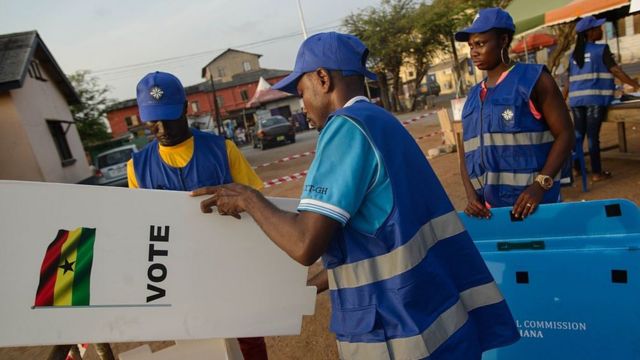Ghana’s presidential election
On Monday, December 7, 2020, some 13 million Ghanaians, out of 17 million registered voters, went to the polls to choose their next president for another four years. The electoral battle was between incumbent President Nana Akufo-Addo of the centre-right New Patriotic Party and his predecessor, John Dramani Mahama, of the centre-left National Democratic Congress […]

On Monday, December 7, 2020, some 13 million Ghanaians, out of 17 million registered voters, went to the polls to choose their next president for another four years.
The electoral battle was between incumbent President Nana Akufo-Addo of the centre-right New Patriotic Party and his predecessor, John Dramani Mahama, of the centre-left National Democratic Congress (NDC).
- 20,000 business owners apply for COVID-19 survival fund in Yobe
- 2023 polls: Yakubu lists top agenda, 1508 activities
There were 10 other presidential candidates, but Akufo-Addo and Mahama were more prominent in the contest.
On Wednesday, the Electoral Commission of Ghana declared incumbent Akufo-Addo as winner with about 51.59 per cent of the votes cast.
The front runners, Akufo-Addo, 76, and Mahama, 62, have been political rivals since 2012. Mahama won in the 2012 election, but lost to Akufo-Addo in 2016 and further won the 2020 presidential election.
Monday’s polls would be the eighth consecutive democratic election in Ghana since the country’s return to civilian rule in 1992.
Apart from the continuum of democratic elections, Ghana has held peaceful, free, fair and transparent elections over this period.
President Akufo-Addo emphasised this in his pre-election broadcast to Ghanaians when he said: “The entire world is looking up to us to maintain our status as a beacon of democracy, peace and stability.
“In this 4th Republic, we have had the longest, uninterrupted period of stable, constitutional governance in our history, banishing the spectre of instability that disfigured the early years of our nation’s existence, and the benefits are showing.”
What is significant about the election is not just about the winner and the loser, but the relatively peaceful conduct of the polls, a deviation from violence, fraud and lack of transparency that bedevilled recent elections in several West African countries.
Though the Ghanaian Police Service acknowledged that there were violent incidents, the death toll was relatively low.
The police said, “Twenty-one of the incidents are true cases of electoral violence, six of which involved gunshots resulting in the death of five.”
We do not support electoral violence of any sort or scale, but the minimal casualties show that Ghana’s security agencies demonstrated they were effectively in control of the violence that erupted during the presidential election.
This contrasts the rancourous elections that took place recently in neighbouring Ivory Coast and even Guinea.
In Ivory Coast, for instance, President Alassane Ouatarra, manipulated the constitution to run for a third term, against the two-term limit prescribed in the constitution that brought him to power.
The situation in Guinea was not different. Election Observers from the European Union, African Union and ECOWAS were unanimous on the fact that the election in Ghana was relatively peaceful, free and fair.
We commend the ruling and opposition parties in Ghana for their resolve to use the country’s courts in resolving disputes that would arise from the conduct of the election, instead of taking the law into their hands by using the military or non-state actors to unleash violence on the people.
It is noteworthy that Ghana did not conduct the peaceful election because the conditions for doing so were perfect.
Ghana did not have to import and deploy machines for electronic voting to make the just concluded-election free, fair and credible.
As reported in the international media, the voting process was manual as voters had to queue up at polling units in all the 16 regions of the country to cast the ballots.
It is apparent that if stakeholders in Africa would cooperate with electoral umpires, peaceful and credible elections could be conducted without the deployment of sophisticated technology that amounts to a waste of scarce resources.
We call on African countries to emulate Ghana’s successful election.
They should eschew the use of military or thugs to intimidate opposition candidates; vote buying; ballot box snatching; ballot box stuffing; outright rigging; bias on the part of electoral umpires; and other related electoral frauds that have defaced democracy in Africa.
Ghana has proved that transparent election is not rocket science.
It is achievable through the commitment of all stakeholders to the electoral process.
